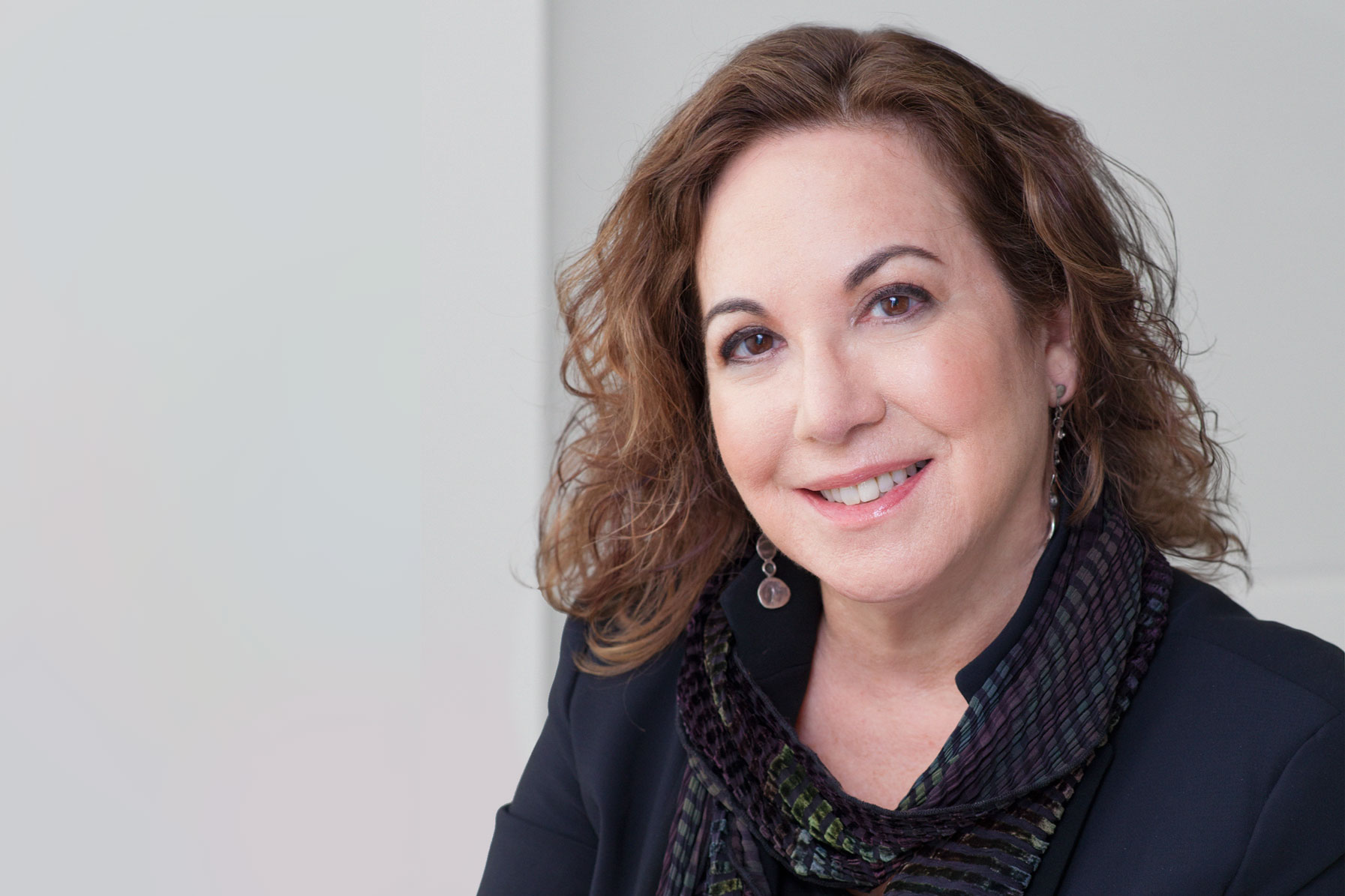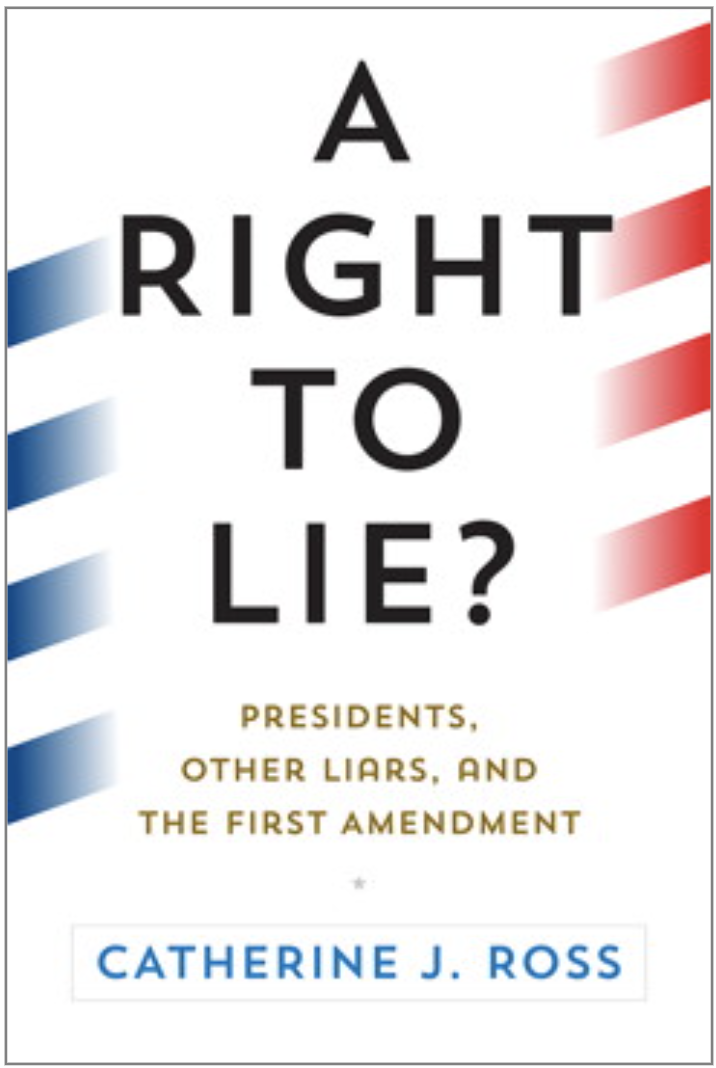A Right to Lie? New Book Explores Complex Constitutional Questions

A Right to Lie? New Book Explores Complex Constitutional Questions
Catherine J. Ross, Lyle T. Alverson Professor of Law, specializes in constitutional law (with particular emphasis on the First Amendment) and family law, including legal and policy issues concerning children. Her book Lessons in Censorship: How Schools and Courts Subvert Students' First Amendment Rights (Harvard University Press, 2015) received the Critics’ Choice Award from the American Educational Studies Association.
In this Q&A interview, she discusses the arguments outlined in her new book, A Right to Lie? Presidents, Other Liars, and the First Amendment (University of Pennsylvania Press, 2021)
Q: What initially spurred your interest in exploring the topic of “lies and the presidency”?
In 2012 the Supreme Court held for the first time that lies (verifiable factual falsehoods) were protected speech under the First Amendment, United States v. Alvarez. I was asked to analyze the decision—which overturned a federal law that criminalized false claims to holding high military honors—as part of a law school faculty series on each term’s most important cases. The decision was surprising and left many issues unresolved, so it kept teasing my mind as I finished other projects.
Q: Can you talk about the book’s central question, “A Right to Lie?” What does it mean to have the right to lie?
The answer is complex. Briefly, lies are not entirely outside the protection of the Speech Clause. Factual falsehoods are not “unprotected speech” like incitement or obscenity, though some unprotected speech involves lies—like perjury, defamation or fraud.
Alvarez indicates that the government violates the First Amendment when it punishes lies just because they are false; the court’s opinion indicates that the government must show something more, like harm to others or unjustified benefit to the liar, before it can criminalize falsehoods. On the other hand, there is no broad “constitutional right to lie.”
Q: From a legal perspective, what is the central legal problem you are wrestling with in your book?
Lies, especially those told by high-ranking public officials, can endanger the nation and threaten the foundations of democracy itself. Falsehoods are key weapons in the authoritarian’s arsenal. At the same time, freedom of expression is a foundational principle of our constitutional system. So, it’s essential to understand the First Amendment obstacles to regulating lies.
The foremost is that when the government defines what is true or false it risks becoming what George Orwell called the “arbiter of truth,” a danger many judges have noted. My first problem was to try to make sense of confusing doctrine, which I did using dramatic cases and incidents.
Q: In your opinion, what should the penalty be for a president who willfully spreads lies?
Congress should exercise its oversight powers from investigation and censure through impeachment, removal from office and disqualification over a mendacious president who willfully repeats material and verifiable factual falsehoods that threaten to harm the body politic.
In my book, I explain how treating presidents as the public employees they are diminishes their expressive rights under the First Amendment. Recent events including the Senate’s failure to convict President Trump underscore that this approach is unlikely to succeed in our current hyper-partisan political climate, but it offers a constitutional pathway for constraining lying presidents and high officials.
Q: In a talk at the Cato Institute, you mentioned that you had finished your manuscript shortly before the events of Jan 6 at the Capitol, and that those events caused you to revise your manuscript. In what ways did these events have an impact on your manuscript?
I was about to submit my manuscript to my publisher within days of January 6. I had already included Trump’s lies about electoral legitimacy as an example of factual falsehoods that harm democracy, but after January 6, I needed to continue that story to show where those lies led.
I included Trump’s incitement of the January 6 mob (incitement that meets the legal definition has no First Amendment protection), his second impeachment, and the second Senate trial and explained the fatal flaws in the First Amendment defense his lawyers offered.
I revised the opening and closing chapters because the developing facts underscored the urgency of my initial premise: that disinformation and fabrication undermine democratic norms and serve authoritarianism. Unfortunately, my last chance to update the manuscript came just a few days before the Republican leadership in Congress refused to participate in a bipartisan inquiry into January 6.
Watch Professor Ross’ talk at Cato Institute
Q: What do you hope readers will take away from the discussion in your book?
I wrote my book to be accessible to readers who aren’t lawyers, with clear prose, explanations of legal terms and processes, and dramatic stories about real people and cases. I hope the book will help people understand why the First Amendment makes it so hard to restrain expression like bald-faced lies that seem worthless and the complexities that arise when we try to regulate lies.
For example, how do we define verifiable factual falsehoods? What about innuendo, prevarication, and just bullshit? Can we even agree on what is true or false? And can we do that without making the government the arbiter of truth? Consideration of these problems should make people pause before saying “there outta be a law.”
At the same time, I hope readers will recognize the risks rampant lies and disinformation pose to our democracy, and that they’ll become more engaged in pushing back against falsehoods in media, social media, and political life, remembering that the First Amendment only restrains government action.
Q: How does your research and work on this book integrate with your teaching at GW?
I teach constitutional law, including the First Amendment. I am always cross-fertilizing my teaching and my research and bringing hypotheticals from my writing and from cases in the lower courts as well as emerging legal doctrine into my classes. And I’m indebted to my wonderful law students at GW whose questions inspire me to refine and clarify my writing.
Professor Ross will be discussing her book at the Constitution Center in Philadelphia with Richard Hasen and Jeffrey Rosen on March 10; and at the Brennan Center on May 4 in the panel discussion titled “Big Lie and the First Amendment.”
A Right to Lie? Presidents, Other Liars, and the First Amendment
By Catherine J. Ross
Professor Ross addresses the urgent issue of whether the nation's highest officers, including the president, have a right to lie under the Speech Clause, no matter what damage their falsehoods cause. Does freedom of expression protect even factual falsehoods? If so, are lies by candidates and public officials protected? And is there a constitutional path, without violating the First Amendment, to stop a president whose persistent lies endanger our lives and our democracy?
Upcoming Events
May 4 - “Big Lie and the First Amendment" Panel Discussion at the Brennan Center

Catherine J. Ross
Professor Ross is the Lyle T. Alverson Professor of Law at the George Washington University Law School, where she specializes in constitutional law (with particular emphasis on the First Amendment) and law concerning families and children. Her books include Lessons in Censorship: How Schools and Courts Subvert Students' First Amendment Rights and Contemporary Family Law (5th ed.), a co-authored casebook.


